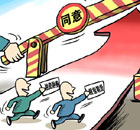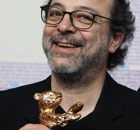Top Biz News
Market restrictions to end in 15 yrs: expert
By Stuart Leckie (China Daily)
Updated: 2010-02-22 09:43
 |
Large Medium Small |
Bourses expected to be fully open to foreign investors by 2025
Direct foreign dealing in Chinese stocks is currently restricted through the government's Qualified Foreign Institutional Investor (QFII) scheme.
|
 |
|
Stuart Leckie, chairman of Stirling Finance. |
Stuart Leckie, chairman of Stirling Finance, a leading Hong Kong-based pensions investment adviser, said all restrictions could be off by 2025.
"All financial institutions will then be able to invest in the stock markets on the Chinese mainland, just as they do in Hong Kong, Japan or any other market," he said.
"It is 30 years since China's opening up and it will take half as long again for this to happen."
He said the Chinese mainland would gradually lift barriers in the same way Taiwan and India have done in recent years.
Leckie, author of the book, 'Pensions in China', and who was speaking at the Trade Tech 2010 Investment Conference, was bullish about the outlook for the Chinese market.
He said the Shanghai Composite Index could double within the next three years and that it was a matter of if, not when, it returned to its all-time high of 6,124 in October 2007.
"I am sure the index will double over the next five years but there is a chance it will double in the next three years," he said.
Other speakers at the conference were also optimistic about the outlook for investors in Chinese stocks. Michael Wang, head of dealing at the China International Fund Management said the Chinese market was full of opportunities.
"It is a golden opportunity to invest in China. Blue chip companies are still very cheap," he said. "In the medium term there might be some correction but we won't go back to 2006 levels (when the market was just over the 1,000 level)."
Kent Rossiter, head of trading, Asia Pacific, for fund manager RCM, based in Hong Kong and which is part of the Allianz Group, was also confident. "I am really bullish about opportunities. I am worried about volatility, however," he said.
Rossiter said some of the volatility was down to the inexperience and lack of competence of some professional investors in the Chinese market.
"The market needs to develop," he said. "Professional investors need to improve their performances. They have too much of the same mentality as the man on the street in that they just like to buy and sell without taking any view."
| ||||
"China is not about to become another Japan with the level of the index standing at a quarter of what it was 20 years ago."
He was not concerned about the poor start to the Chinese markets in 2010 with the major index losing 8 percent of its value in January and falling through the 3,000 barrier. It increased by 80 percent in 2009. "Obviously China has got off to a weak start. It was the second worst performing market internationally in January after being the best performing in 2009. It is just living up to its reputation as a volatile index."
He said he expected the market, however, to rise by up to 15 percent in 2010 to a value somewhere between 3,600 and 3,800 from its Jan 1 level of 3,277. "I think this January decline is overdone."












